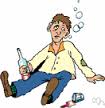
记忆方法
将“inebriate”分解为“in”和“ebriate”。记住“in”是前缀,表示“进入”,而“ebriate”与“ebriety”相似,意为“醉酒”。所以,记住“inebriate”为“使某人进入醉酒状态”的意思。可以将“inebriate”形象化地想象为“让某人‘进去’醉酒”,以此辅助记忆。
以上内容由AI生成, 仅供参考和借鉴
英语词源
- inebriate
-
inebriate: [15] Latin ēbrius (a relative of sōbrius, from which English gets sober) meant ‘drunk’. From it was formed the verb ēbriāre ‘intoxicate’, which with the addition of the intensive prefix in- produced inēbriāre ‘make very drunk’ – whence English inebriate.
=> sober - inebriate (v.)
- late 15c., from Latin inebriatus, past participle of inebriare "to make drunk," from in- "in" (see in- (2)) + ebriare "make drunk," from ebrius "drunk," of unknown origin. Related: Inebriated; inebriating. Also inebriacy; inebriant (n. and adj.); inebriety; and inebrious.
权威例句
- 1. Drinking tea can inebriate people in summer.
- 夏季饮茶不当也会让人有醉的感觉。
